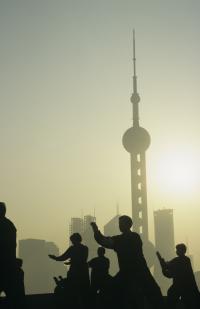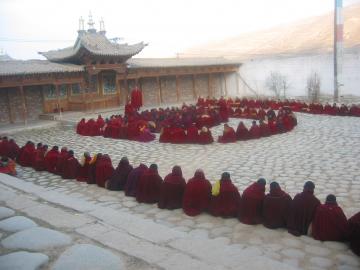MSc in Contemporary Chinese Studies
MSc in Contemporary Chinese Studies
The MSc in Contemporary Chinese Studies is a three-term, nine-month course designed to provide high quality graduate research training with an emphasis on an appreciation of research methods and on deepening your understanding of contemporary China.
You will develop or extend your knowledge and understanding of:
- the key approaches to the social scientific study of modern China;
- research methods, strategies and ethics that will be of relevance to the social scientific study of China;
- critical analysis of sources and ability to present findings effectively, both verbally and in sustained writing exercises;
- framing and executing a workable research topic; and
- interdisciplinary research and its potential.
Courses involve lectures as well as seminar or class discussions, for both of which you will receive reading lists. It is a fundamental component of the Oxford educational system that you engage in individual reading and study in order to broaden and deepen your knowledge of your chosen field.
There is limited one-to-one teaching on MSc courses. However, staff members will be available to advise you on reading, literature and topics. You will also be given a supervisor to help guide you through your thesis research through regular one-to-one meetings. Supervisors are assigned in Week 0 of Michaelmas Term, and assignment is based on your stated research interests and goals.
To learn more about the MSc in Contemporary Chinese Studies, view the tabs below.
This course is not yet open for admissions for 2026-27 entry.
MSc in Contemporary Chinese Studies - Programme Details

The teaching on the MSc programme is built around the two core courses. The first core course, Research Methods, will introduce you to the strengths and weaknesses of contrasting discipline-based approaches to the study of Asia.
The second core course, The Study of Contemporary China, teaches foundational knowledge of modern Chinese history, politics and society needed for further study or research in all disciplines, and introduces the different disciplinary approaches to the study of modern China.
In addition to the two core courses you will choose two option courses and complete a research thesis of 12,000 words on a research topic of your choosing, subject to approval by the Graduate Studies Committee.
Option courses each have their own method of assessment, which can include examinations, usually scheduled in Trinity Term, essays, projects and take-home tests. The MSc handbook, distributed prior to students’ arrival in Oxford, will give further information on assessment for option courses.

In addition to classes, seminars are held by the China Centre once a week in the evenings. These are given by a wide range of speakers on topics relating to their research and work. Students will be notified of time, dates, and topics via email and announcements on the MSc in Contemporary Chinese Studies website. Students should consider the seminar series and special lectures integral to their time in Oxford.
The MSc is jointly taught by staff within Social Sciences and Humanities, who will also assess your application. The application process is administered by the Oxford School of Global and Area Studies.
The degree is designed for students from a wide range of backgrounds. Students may well wish to proceed to this degree from undergraduate courses in such areas as History, Politics and International Relations, Economics, Geography, Anthropology, Sociology, Media or Cultural Studies with some element of coursework on China. However, previous undergraduate coursework on China is not a compulsory requirement for admission. We welcome also applications from students with a background in natural sciences, for instance, who may wish to develop knowledge and skills in the Social Sciences and Humaniites - whether in order to broaden their disciplinary range for natural science research, or to begin a switch in discipline.

In addition, applications will be considered from those, whether or not they have an academic background on China, who have worked in NGOs, civil service, journalism, private sector, or similar fields and who wish to consolidate and extend their knowledge through sustained academic study.
Applicants are required to have some knowledge of Mandarin. This may include records from formal language training successfully undertaken, or evidence of residence in China or Greater China over an extended period,or other evidence that shows some existing language competency.
This course can also serve very well as first stage preparation for subsequent doctoral research on China. Other paths graduates take include government and public service at international institutions, development and NGOs, major private sector firms in industry or finance, commercial research agencies and international consulting.
Core Course 1: Research Methods
The Research Methods course comprises two parts: Part One on concepts and concept formation and Part Two on research practice and methods.
Part One invites students to explore the relationship between the social science disciplines (such as sociology, anthropology and political science) and the empirical study of an area such as China and to reflect on strategies for integrating social science theory with the production of area-specific knowledge. This conceptual part of the course also considers the ethical dimensions of social science research and the politics of knowledge production.
Part Two takes students through a range of practical approaches to research design, data gathering and data analysis. For each of these teaching sessions, a study of approaches to the collection and analysis of different kinds of data is combined with an examination of the challenges and opportunities involved in applying these approaches in the area of China Studies. Topics to be covered in this part of the course include the use of historical archives; the collection and analysis of oral narratives and written texts; interviewing, ethnography and fieldwork; social surveys and questionnaire design; simple strategies for data management and data presentation; and an introduction to basic statistics and the interpretation of quantitative data. In class exercises and in assessed written work students will be required to obtain and demonstrate a general understanding of approaches to research whilst at the same time enjoying the opportunity and flexibility to specialise in accordance with individual disciplinary and research interests.
This course consists of weekly lectures and classes in Michaelmas term and weeks 1-5 in Hilary term. In addition, students attend a number of other activities including computer lab classes and a fieldwork safety lecture.
Course Assessment
Assessment for this course comprises two parts, each weighted equally.
- A practical exercise in the collection and analysis of qualitative data, word limit 2500 words.
- A take-home test in quantitative analysis
Core Course 2: The Study of Contemporary China
This course teaches foundational knowledge of modern Chinese history, politics and society needed for further study or research in all disciplines, and introduces the different disciplinary approaches to the study of contemporary China, particularly in politics, international relations, history, economics, anthropology, sociology and geography. All students on the course take the lecture course, classes and tutorials in preparation for the general paper on modern China of the final examination.
Topics that may be covered during the course include the following:
- What was the Chinese Revolution?
- The Drivers of China’s Foreign Policy after 1949
- The Causes and Consequences of the Cultural Revolution
- China’s Economic Transition and Change since Reform and Opening
- The structure and workings of China's party-state.
- Labour migration in the context of contemporary China-Africa Relations
- Marriage in Contemporary China
- Islam and the Law in Contemporary China
Please note that course content changes each academic year.
Course Teaching Arrangements
- A weekly one-hour lecture and a student-led seminar class.
- Students will write two un-assessed essays of 1000-1500 words on which they will receive written feedback and supervision in a small group.
Course Assessment
Assessment is by one three-hour exam held in week nought of Hilary term.
Please address your enquiries concerning the MSc in Contemporary Chinese Studies to:
chinesestudies@area.ox.ac.uk
Option Courses
Students will choose two option papers.
(Please note that not all options on the list may be available each year. The definitive list of approved options, together with information on content and structure, will be available from the Course Director and will be published in the course handbook at the beginning of each academic year. Other disciplines may be possible with agreement of the Course Director.)
Option papers offered may include the following:
This course offers an introduction to key issues in China’s economic development since economic reforms began more than three decades ago. Emphasis is placed on the political economy of economic reform and the current challenges facing the Chinese economy.
This course focuses on modern Chinese History, considering topics such as the collapse of the late Qing (students might consider through their essays questions like how important was opium to the collapse of the Qing dynasty? or could the Qing state have coped better with internal rebellion?), the May Fourth Movement (Why were May Fourth reformers so interested in ideas of science and democracy?), the rise of Communism (How important was the peasant revolution to the Communist victory?), China at war (How did the war against Japan change Chinese society?), and the cultural revolution (Was the Cultural Revolution ultimately about power, not ideology?).
Over Hilary Term students will learn up to 2500 of the most commonly used Chinese characters. The students will also receive training in the skills of the language analysis, translation and the cultural understanding of the Chinese written material on social-science topics.
This is a graduate colloquium designed for students in modern Chinese art. Classes will include viewing of paintings in the Ashmolean collection and the development of skills in identifying paintings and prints dating from the late Qing to the present. Each class will combine examination of works of art with discussion of the art historical, intellectual and political contexts in which they were produced.
This option provides an introduction to the political history and development, political sociology, political ideologies and institutions, and the political economy of China in a comparative context. Students will have the opportunity to read and consider a number of approaches to conceptualizing, modelling, and analyzing Chinese politics within the broader framework of comparative social science methods, with a particular focus on situating China as a case within the field of comparative politics.
This course option will explore China’s evolving role in the international political and economic system and will examine the country’s external relations with key state, non-state, and institutional actors. No prior knowledge of China or the East Asian region will be assumed. The programme will lay emphasis on an empirically-led but theoretically informed analysis of the extent and character of China’s interrelationships within international relations, so as to be able to better understand how geopolitical interactions overlap with specific policy priorities to shape outcomes at the regional and global levels.
To intending applicants, please note that the option course in the International Relations of China will not be offered in the academic year 2022-2023. This option course is scheduled to resume in the academic year 2023-2024.
This course explores Chinese literary practice in the era of market reforms, taking 1989 as its point of departure. We read a wide range of novels and short stories in English translation, complemented by extensive reading in English-language scholarship.
This course explores how filmmakers in the post-Mao period have represented China's turbulent twentieth century in their work. From the Sino-Japanese War to the Cultural Revolution, and from the Tangshan earthquake to the building of the Three Gorges Dam, Chinese cinema over the last thirty years has engaged intensively in the recording and remembering of history, both from temporally distant perspectives and as events unfold in real time.
We will assess the limits and possibilities of law in an authoritarian regime to understand how rights work in China and how they may or may not ensure accountability over those in power. This course will be of interest to students who arrive to the study of China from a number of backgrounds and who intend to engage China from any number of professional capacities, whether business, research, journalism, diplomacy, human rights advocacy or civil society.
This course will examine technology and industrial development and policy in developing countries and their role in the development process, drawing upon the experience of a wide range of countries, particularly from East Asia and BRICS, to illustrate the analysis. It looks at the interrelations between transnational corporations, domestic firms and the state, the debate on industry policy, the functions of the national innovation system, the interactions between foreign and indigenous innovation efforts, the debate on appropriate technology, and the role of technology in inclusive and sustainable development. The course will be accessible to students without a prior background in economics.
Thesis
The bulk of the Easter vacation and Trinity term will be devoted to research and writing the thesis. For 2017-18 students, this will be 12,000 words including footnotes but excluding references/bibliography. Topics will be developed by students in association with their thesis supervisors. Topics may fall within any area for which supervision can be provided. These will be approved by the management group for the degree and also discussed in a participatory seminar with other students.
The thesis will test students' capacities to: understand concepts and arguments in the literature; develop their own independent arguments; demonstrate knowledge of empirical material and to present it in a coherent manner; formulate a research project, discuss appropriate methodologies, and write a substantial piece of work. Students will be encouraged to work towards displaying strong analytical power and originality either in a fresh approach to texts and literature or in generating new evidence. It is not required that Chinese materials will be used for the thesis; rather, it is expected that the thesis will mainly draw upon both secondary literature and primary sources in English. The thesis will be examined for its competence, conceptual grasp, and innovation.
The use of primary sources through fieldwork is not compulsory for successful completion of the MSc’s thesis. Students who decide to undertake fieldwork as part of their research should note that they will ordinarily have to meet all of the costs themselves. These costs are likely to include, but may not be limited to, travel, subsistence, insurance, and, where appropriate, visa and medical fees (e.g. for vaccinations). As research sites are ultimately determined by the individual, costs can vary considerably according to the duration and location of the proposed fieldwork. Travel grants of up to £400 may be made available to selected students as a contribution to the costs of conducting primary research activities connected with their thesis, subject to the approval of the Contemporary China Studies Management Committee.





